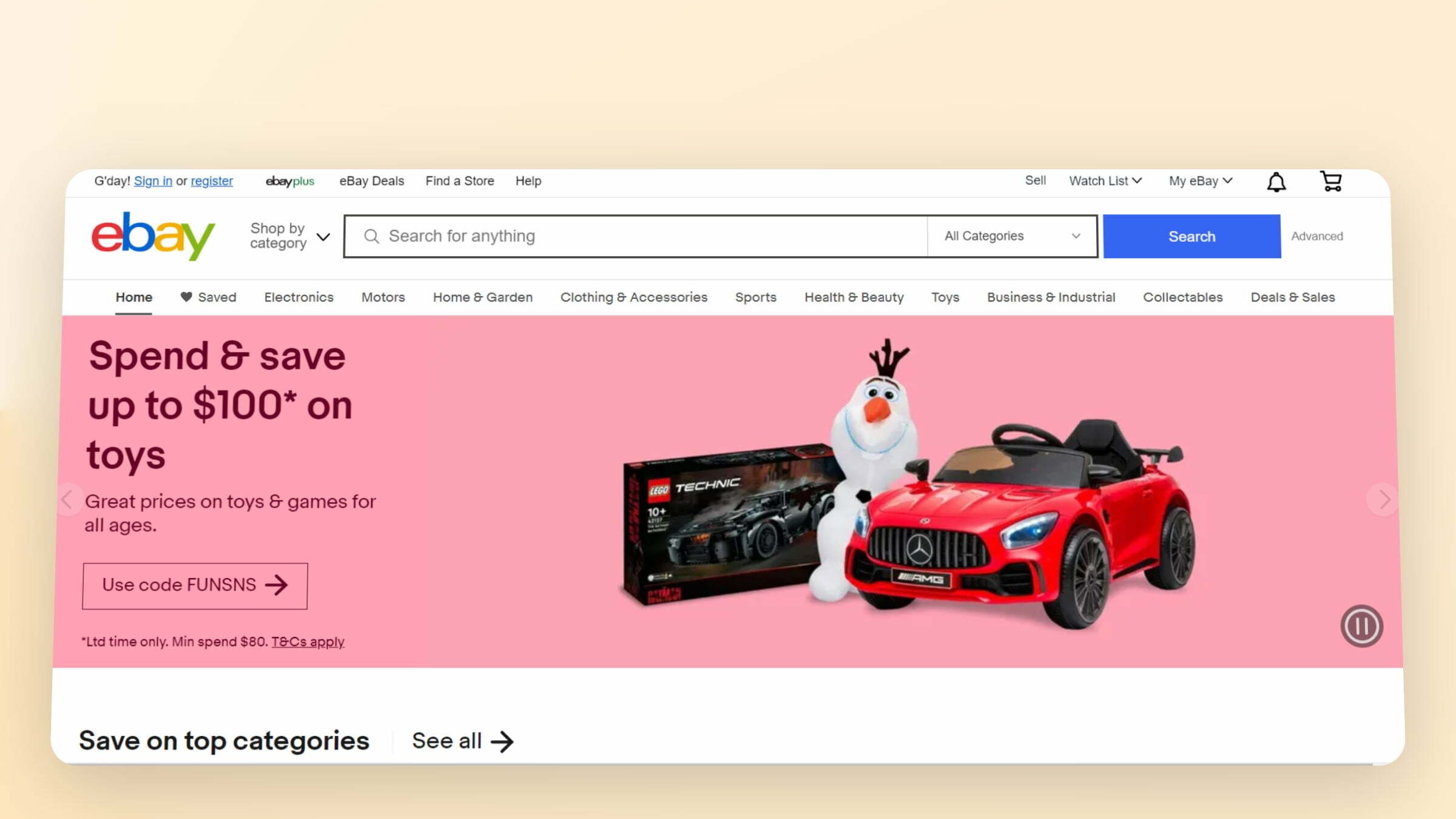

Shopify Vs eBay: Which One Is Best For Your Business in 2023

As Seen On
Which is the better eCommerce platform to use in 2023: eBay or Shopify? This is a question that has been debated for years, but we’re finally going to answer it once and for all.
In this blog post, we will compare both eCommerce platforms.
We will break down each platform’s pros and cons so that you can make an informed decision about which platform is best for you in to set up your online business in 2023.
Keep in mind that these opinions are solely our own and that you should do your own research before deciding on a platform.
Let’s get started!
What is Shopify?

Shopify is many things. It’s an eCommerce platform. It’s a point-of-sale system. It’s a payments processor. It’s a shopping cart. It’s a hosted solution. It’s an open-source platform.
You could say that Shopify is everything you need to run your online store. But what exactly is Shopify?
In a nutshell, Shopify is a software as a service (SaaS) platform that enables you to create an online store and sell products.
Shopify provides all the tools and features you need to run your store, from hosting and domain names to powerful eCommerce features and payment processing.
You can use Shopify to sell physical or digital products or even services.
And because Shopify is a hosted solution, you don’t need to worry about installing or maintaining any software – it’s all taken care of for you.
So there you have it – that’s Shopify in a nutshell. A powerful, flexible eCommerce platform that can help you sell anything, anywhere.
What is eBay?

eBay is one of the world’s largest online marketplaces as well as one of the oldest eCommerce selling platforms, where people from all over the globe come to buy and sell just about anything.
Whether you’re looking for a new car, a new pair of shoes, or even a new home, chances are you can find it on eBay.
And if you’re looking to get rid of something, eBay is a great place to sell it.
Just list your item, set a price, and wait for someone to buy it. It’s that easy!
Difference Between Shopify And Ebay
The two sites are quite different. While both offer users a platform to sell goods, they each have their pros and cons – let’s take a closer look at them!
Fees/Plans
Shopify:
On Shopify, you pay monthly subscription fees for a plan. Here are the three plans they offer:
Basic Shopify – $29/mo
Shopify – $79/mo
Advanced Shopify- $299/mo
eBay:
On the other hand, eBay pricing offers the following plans:
Basic – $24.95/mo
Feature – $54.95/mo
Anchor – $549.95/mo
You can see their fees structure here:
https://www.ebay.com.au/help/selling/fees-credits-invoices/fees-business-sellers?id=4122
Branding
Shopify is all about branding. You can create a custom domain, design your own website, and really make your store stand out. In short, you can create your own branded online store.
eBay, on the other hand, is more about selling things quickly and easily. You don’t have as much control over your branding, but you don’t need to put in as much work either.
Product Pricing

When it comes to product pricing, Shopify and eBay operate on different systems.
Shopify:
On Shopify, you set the price for your product and then the platform takes a cut of that amount.
Shopify typically charges lower prices for its products than eBay does. This is because Shopify operates on a subscription model, so sellers only have to pay a monthly fee to list their items
eBay:
eBay, on the other hand, uses an auction-based system, where sellers list their product at a starting price and buyers can bid on the item. The winner of the auction pays the final price for the product. So, if you’re selling products on either platform, it’s important to be aware of how pricing works.
It’s important to note that eBay, charges sellers a commission on each sale. This means that eBay prices can sometimes be inflated since sellers need to make enough profit to cover their costs.
Customization
Shopify:
On Shopify, you have complete control over the look and feel of your own store. You can choose from a variety of themes, or hire a designer to create a custom theme for you. In short, you have full liberty of your store customization.
eBay:
eBay, on the other hand, has very limited store customization options. You can choose from a handful of basic templates, and that’s about it.
Verdict:
If you want your store to stand out from the crowd, Shopify is the way to go.
Customer Behaviour
Shopify:
In Shopify, you can track the behaviour of your customers using Apps. You can see what they do on your site, including clicks, scrolls, add-to carts, contact form submissions and more.
eBay:
On the other hand, eBay offers only feedback and reviews from customers. This can help gauge customer interest for a particular product or category of products.
Seller Protection
Shopify:
On Shopify, all transactions are processed through Stripe, which offers robust fraud protection.
eBay:
eBay, on the other hand, uses PayPal for payments, which provides only limited protection for sellers. This means that if you’re selling on eBay, you’re more likely to be the victim of fraud.
Verdict:
So if you’re looking for a platform that will give you peace of mind, Shopify is the way to go.
Analytics

If you’re like me, you love nothing more than spending hours upon hours analyzing data. This is why, when it comes to choosing between Shopify and eBay, there’s really only one obvious choice: Shopify. Why?
Because while eBay does provide some data about your sales and traffic, it’s pretty limited compared to what Shopify offers. With Shopify, you get access to detailed reports about your store’s performance, including information on your most popular products, where your traffic is coming from, and how much revenue you’re generating.
In other words, if you want to know exactly how your business is doing, Shopify is the way to go. So if you’re looking for a platform that will give you insights into your business, there’s really no contest: it’s got to be Shopify.
Ease of use
eBay is a great platform for selling stuff online, but it can be a bit of a pain to use. You have to create listings, ship items, deal with customer service, etc.
Shopify makes it easy to sell online by taking care of all the tedious details for you. Just create your products, add them to your shop, and start selling!
Plus, Shopify has way better customer support than eBay–you can actually talk to a real person if you have any problems. So if you’re looking for an easy way to sell online, go with Shopify.
Apps
Shopify:
Shopify offers a huge app store with hundreds of apps to choose from. You can find Apps for almost everything like shipping, accounting, inventory management, live chat, etc.
eBay:
On the other hand, eBay offers things like shipping and inventory management inbuilt but doesn’t provide Apps or Plugins to maximize efficiency.
Control
Shopify:
Shopify vs eBay is like the difference between owning a house and renting a house. With Shopify, you’re in complete control of your online store. You can design it however you want, add or remove products at any time, and set your own prices.
eBay:
eBay, on the other hand, is more like renting a house. You’re limited in terms of what you can do with your store page, and you have to follow eBay’s rules and regulations.
Plus, you don’t have as much control over pricing since buyers can make offers on your items.
Verdict:
So if you’re looking for complete control over your online store, Shopify is the way to go. But if you’re just starting out and want an easy way to get started selling online, eBay might be a better option.
Shopify vs Ebay Dropshipping
Dropshipping is allowed on both platforms, but you need to be more cautious on eBay as they have stringent policies.
On Shopify, you are on your own and not answerable to anyone but your customer.
Opt-ins
Shopify is a good option if you need email opt-ins or if you want to send Push Notifications to your subscribers.
eBay doesn’t offer any such option for marketing.
Auction
eBay offers an auction option where you can set a specific time duration for your listing, and reserve price, and the highest bidder will get to buy that product.
Unlike eBay, there is no such option available inbuilt in Shopify. However, there are apps available that you can use to list Auction Items.
Blog
Shopify:
Shopify offers an inbuilt blog, where you can post blogs, and updates and make announcements.
eBay:
eBay doesn’t provide a blog option.
Traffic
eBay:
eBay is one of the world’s largest online marketplaces, with over 187 million active buyers around the globe.
eBay has a large customer base which means that sellers like you can reach out to customers worldwide.
Shopify:
Shopify is just a store builder, and you will have to run ads or do SEO to get traffic and sales.
Frequently Asked Questions:
u003cstrongu003eWhich types of businesses should use Shopify?u003c/strongu003e
Shopify is the best option for:u003cbru003e1. People who want to establish a brand.u003cbru003e2. People who like more control over things.u003cbru003e3. People who want to publish blogs as well as products.u003cbru003e4. People who need detailed analytics.u003cbru003e5. People who want to avoid extra or hidden fees issues.
u003cstrongu003eWhich types of businesses should use eBay?u003c/strongu003e
eBay is the best option for:u003cbru003e1. People who want to sell their goods and are not looking for many customization options.u003cbru003e2. People who are selling used or refurbished merchandise because eBay has such an established customer base.u003cbru003e3. People who don’t want to spend time and money on Ad Campaigns or SEO to get traffic.u003cbru003e4. People who want to do a side hustle and don’t need to be a ‘brand’.u003cbru003e5. People who are testing some products before launching their brand.
u003cstrongu003eWhich types of businesses should use both?u003c/strongu003e
As you have seen, both have their advantages and disadvantages. If you want to enjoy the benefits of both, you could use them together.u003cbru003eu003cbru003eFor example, if you need a huge customer base and want to build your brand with your own preferences, you should sell on both platforms.
So is Shopify better than eBay?
It depends on what you are looking for!u003cbru003eu003cbru003eThat’s it for this article. I hope it’s been insightful for you. If you still have doubts about u003cstrongu003eeBay vs Shopifyu003c/strongu003e, don’t hesitate to comment down below.u003cbru003eStay tuned for the next post! u003cbru003eu003cbru003eMeanwhile, make sure you share this on your social platforms with people who are curious about this debate and subscribe to our blog as well.
The Bottom Line:
So, what’s the verdict?
In 2023, Shopify is still the eCommerce platform to beat. With its affordability, scalability and user-friendliness, it’s hard to see how anyone could knock it off its perch.
eBay may be an excellent option for certain sellers and businesses, but as a general rule, we recommend sticking with Shopify for your online store. Thanks for reading – we hope this guide has been helpful!
Casey Jones
Up until working with Casey, we had only had poor to mediocre experiences outsourcing work to agencies. Casey & the team at CJ&CO are the exception to the rule.
Communication was beyond great, his understanding of our vision was phenomenal, and instead of needing babysitting like the other agencies we worked with, he was not only completely dependable but also gave us sound suggestions on how to get better results, at the risk of us not needing him for the initial job we requested (absolute gem).
This has truly been the first time we worked with someone outside of our business that quickly grasped our vision, and that I could completely forget about and would still deliver above expectations.
I honestly can't wait to work in many more projects together!
Disclaimer
*The information this blog provides is for general informational purposes only and is not intended as financial or professional advice. The information may not reflect current developments and may be changed or updated without notice. Any opinions expressed on this blog are the author’s own and do not necessarily reflect the views of the author’s employer or any other organization. You should not act or rely on any information contained in this blog without first seeking the advice of a professional. No representation or warranty, express or implied, is made as to the accuracy or completeness of the information contained in this blog. The author and affiliated parties assume no liability for any errors or omissions.

